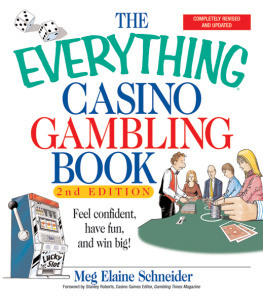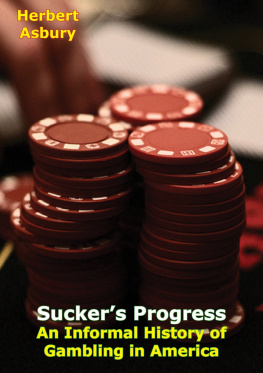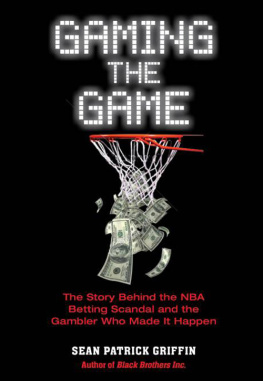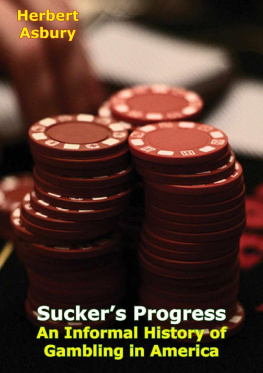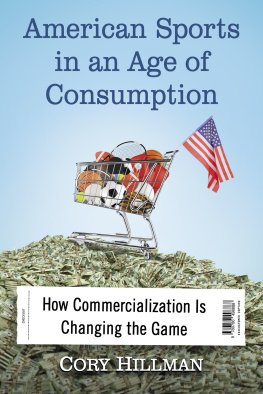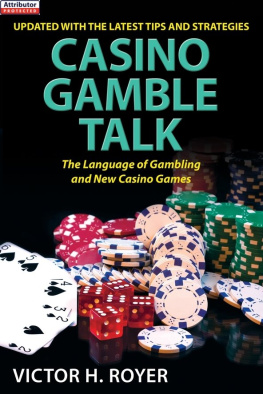LARCENY
GAMES


LARCENY GAMES 2013 BY BRIAN TUOHY
ALL RIGHTS RESERVED
A FERAL HOUSE BOOK
ISBN: 978-1-936239-78-8
10 9 8 7 6 5 4 3 2 1
FERAL HOUSE
1240 W SIMS WAY
SUITE 124
PORT TOWNSEND WA 98368
WWW.FERALHOUSE.COM
DESIGNED BY GREGORY FLORES
CONTENTS
Dont write this book. This is not for the faint of heart. They are going to fucking kill you if they can.
That was the advice I received from investigative journalist Dan Moldea prior to writing even a single sentence of the book you now read. I probably should have taken his words to heart, considering Moldea knows of what he speaks. In 1989, his book Interference: How Organized Crime Influences Professional Football was published, perhaps the only book to investigate game fixing/point shaving in the National Football League (or in any of the professional sports leagues, for that matter). The book, Moldea claimed, destroyed his career. Sometimes I wish they wouldve killed me, he lamented. I really do because it just stopped me. I had a fucking great career going and it just stopped me.
In the case of Interference, the NFL was not caught unaware that Moldeas book was forthcoming, and the league gave him the same treatment it had with Cosell. These guys [NFL security] were out there following me, he said. They would have a tape of every show, they would transcribe every show. I mean it was unbelievable what they did. The effort they put into dealing with me. To top it off, veteran NFL beat writer Gerald Eskenazi was assigned by the New York Times to review Moldeas book. In his critique of Interference, Eskenazi accused Moldea of, among other things, sloppy journalism. Moldea responded by pointing out the factual errors in Eskenazis review, demanding a retraction, and then suing for libel when the New York Times refused to budge. Initially, Moldea won his case, but it soon turned into a lengthy court battle, falling an appeals ruling shy of the Supreme Court. Though publicly supported by the president of the National Book Critic Circle, the Columbia Journalism Review, and the Wall Street Journal, Moldea lost.
I sued the New York Times for libel in a case that lasted longer than World War II, he recounted. I wanted to fight the NFL, and I ended up fighting the New York Times. It was bullshit. It took the heart of my career right out of me. I was fighting the bullshit the New York Times pulled on me and the NFL was behind it all the way.The New York Times critic had lied about me. I sent a letter to the editor which they refused to publish, and then they claimed that I was the one restricting free speech. When do I get my free speech here? The guy wrote lies about me and Im not allowed to respond to it?
It is quite possible that the same thing will happen to me with the publication of this book. And Im foolish enough to take it one step further by not just investigating game fixing and point shaving in the NFL, but in the National Basketball Association (NBA), Major League Baseball (MLB), soccer, tennis, and boxing as well. Moldea even asked me, Are you independently wealthy? Because they can sue you. They can make your life completely crazy. That, to me, is fearsome.
The problem at the heart of this is the fact that I shouldnt have needed to write this book. All of the information presented here should have already been part of many sports fans knowledge baseif the sports media was actually doing its job. This book should not have my name on the cover; it should have been written by Bob Costas or Dan Patrick or Jim Rome or any one of a number of prominent sports media pundits. But it wasnt. Its not backed by the likes of ESPN, NBC Sports or Sports Illustrated. In fact, I doubt any of those outlets will even recognize this book or the facts upon which it is based. If they do, it will only be to marginalize or mock this work as that of mere conspiracy theory because what is alleged in these pages threatens not just the status quo, but more importantly the billions of dollars earned every year in the world of professional sports.
This tome also threatens the livelihood of organized crime in the United States. Although sports gambling is seen as a victimless crime, in truth 99 percent of all sports gambling in the U.S. is done illegally with the vast majority of those untold billions of dollars funneled directly to the mob. It is their top moneymaker, followed closely by the loan-sharking activities which often accompany gamblers who cannot pay off their bookies in time. When games are fixed todayand believe me, games are being fixed todaythe money wagered on these rigged contests is being trafficked through these mob-backed bookmakers, whether they are located on offshore websites or in the backroom of some local pub.
Much of what follows is taken directly from Federal Bureau of Investigation (FBI) case files. These investigative files were obtained through multiple Freedom of Information Act requests, a resource which the NFL, NBA and MLB do not possess for interested parties. The FBI held over four hundred files directly related to sports bribery which is the legal term for game fixing and/or point shaving. These covered everything from horse racing to boxing to college athletic events to the NFL, NBA and MLB (with a notable exception of the National Hockey League). The files are quoted directly. However, though some of these investigations date back 50 years or more, there is still vital information which has been redacted by law. (By the way, the government no longer blacks out what they dont want you to read. Instead a white box omits the tantalizing information.) This is indicated within these pages thusly: [redacted]. Sometimes it is just a name. Other times several sentences or entire pages were blocked. Because of this, a few files were rendered incomprehensible and were not included. However, most investigations relating to professional sports are discussed here. Sometimes the names of those involved remain unknown, yet in many instances a little research and the connecting of a few dots led to the revelation of the suspected guilty parties. For fans knowledgeable of the history of their favorite sports, some of these names will surprise you.
Remember, too, when reading the tales of these investigations, that this is only the information of which the FBI was aware. It doesnt mean these were the only players, coaches or referees suspected by those in the know to have fixed games or shaved points. Like many criminal acts, much goes unreported and uninvestigated for a variety of reasons. This is merely a starting point. How much deeper the rabbit hole goes remains to be known. I just hope that by the time I reach the bottom, I dont need the name of a good lawyer. Or it wont be the NFL or NBA Ill have to worry about. Itll be my wife.
The story of 13-year veteran NBA referee Tim Donaghy is the most recent, and next to the 1919 Black Sox, perhaps the most discussed case of game fixing in professional sports. The problem isand most people have this completely wrongDonaghy was neither arrested for nor sent to prison because he fixed games. The two crimes he pleaded guilty to were conspiring to engage in wire fraud and transmitting betting information across state lines, not game fixing. There were a few reasons why. One, the FBI did not attempt to prove Donaghy fixed a single game. Two, for their own financial reasons the NBA had no desire to see Donaghy convicted for fixing a game. And three, Donaghy wasnt about to admit to a crime neither of those two entities were accusing him of committing.
Next page



